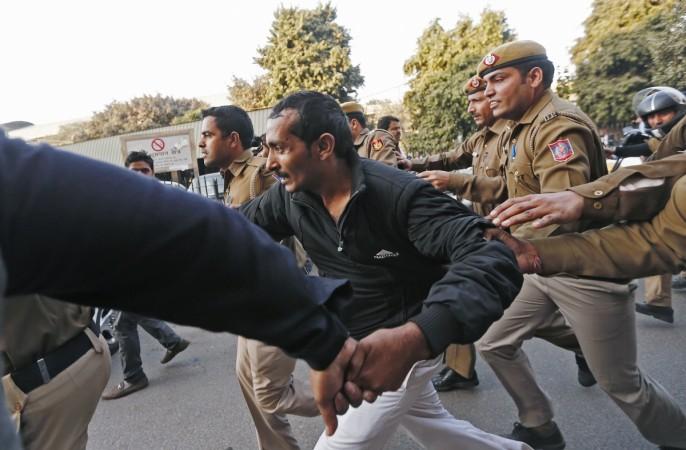
India ordered state governments to halt the operations of all unregistered, web-based taxi companies on Tuesday after a female passenger reported she was raped in New Delhi by a driver contracted to U.S. cab company Uber.
The move in India was followed by separate government and court actions against Uber in Thailand, Spain and the United States on a variety of issues.
The rape case in India has caused uproar after it emerged that the suspect had previously been charged for rape but had obtained a character reference signed by a police officer that was forged.
It has also revealed a failure to regulate the booming market for app-based taxi services in India. The Delhi transport department said it ordered Uber to cease operations on Monday by post.
"Such service providers which are not licensed ... are prohibited to operate till they get themselves registered," Home Minister Rajnath Singh told parliament, where several lawmakers grilled him over the lack of women's safety in the capital.
"The Delhi Police is also exploring the issue of possible legal liability of the taxi service Uber in the crime committed," he said.
Singh's comments came after New Delhi's transport division banned Uber and other similar web-based taxi providers that are unregistered. A public notice on Tuesday stated only six radio taxi companies will operate in New Delhi.
In Thailand on Tuesday transport authorities ordered the company to cease operations, saying drivers picking up fare-paying passengers via Uber were neither registered nor insured to drive commercial vehicles.
In Spain, a judge ordered Uber to cease operations as a local taxi association prepared a case accusing it of unfair competition.
In Chicago, police said they were investigating an allegation that an Uber driver raped a female customer. Uber said it was cooperating with police and called the incident "appalling."
In California prosecutors said that a former Uber driver was charged with misdemeanor vehicular manslaughter in the death of a 6-year-old girl who was struck in a San Francisco crosswalk on New Year's Eve.
Taxi booking apps have irked drivers at traditional taxi firms across the globe. Consumers are increasingly using the smartphone software to find people willing to drive them, rather than booking a cab by phone.
Uber was blacklisted in New Delhi on Monday after police said it had failed to run background checks on the driver, who was held three years ago on suspicion of rape but later acquitted.
The arrested driver, Shiv Kumar Yadav, appeared in court on Monday and was remanded in custody for three days. Yadav had obtained a reference from the Delhi Police, but the deputy commissioner of police for north Delhi Madhur Verma told Reuters it was forged.
Verma also said the police had registered "a case against Uber for cheating its customers and violating government orders".
The Uber case has reignited a debate about the safety of women in Asia's third-largest economy, especially New Delhi, which is often dubbed India's rape capital.
In 2012, a fatal gang rape of a young woman taking public transport in the city led to nationwide protests and forced the government to enact laws imposing stricter penalties and formation of fast-track courts.
Uber was valued at $40 billion last week after its latest funding round ahead of an expected initial public offering. In India, Uber's second-largest market after the United States by number of cities covered, the company has been operating in 11 cities.
The Reserve Bank of India had earlier rapped Uber for violating the country's credit card payment system by using a so-called one-step authorisation process while the regulator requires a two-step procedure. Uber later complied, calling the requirement "unnecessary and burdensome".
UBER STILL ON
A representative for Uber said the company had not been officially notified of any ban in New Delhi and would issue a statement. It was still possible to hail an Uber taxi in Delhi using the company's smartphone application.
"What happened over the weekend in New Delhi is horrific," Travis Kalanick, Uber's chief executive officer, said in a statement on Monday before the ban. "We will do everything, I repeat, everything to help bring this perpetrator to justice."
Uber driver Satish Kumar, who has been associated with the company for 11 months, told Reuters he works for another travel company that is enrolled with Uber. He was unaware of the ban.
"We will only consider a ban once our app stops working," said Kumar, whose company pays 20 percent of the fare to Uber.
"If it is banned, we will suffer losses. It is up to the authorities to do the checks. Why blame the company and make others suffer?" he asked.
Before joining Uber, Kumar said he was trained for two days on basic etiquette and using the mobile app. He only submitted a copy of his driving licence and identity card to the company. He was not interviewed.
Uber taxis were also violating norms by plying within the city despite having an all-India tourist permit that mandates only inter-state travel, a government official said.
"They have not made any efforts to get themselves registered. They have just tried to use the loopholes in the system to run a service and gain commercially," said a Delhi transport department official on condition of anonymity.














